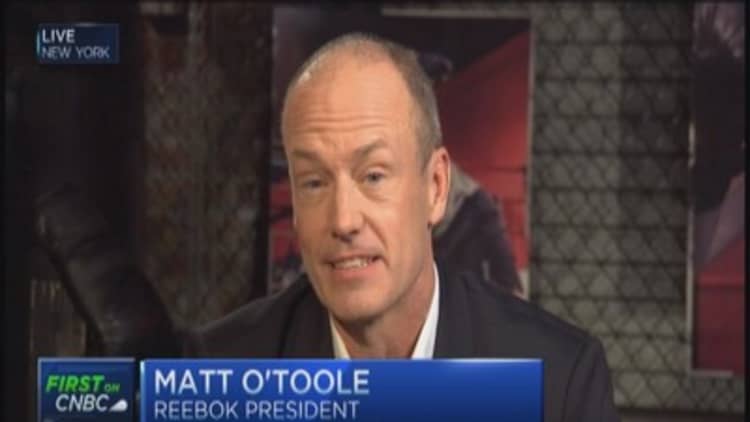Ronda Rousey took Cat Zingano to the ground and constricted her arm in a jumbled twist, forcing Zingano to concede just 14 seconds into Saturday's UFC 184 final fight at the Staples Center in Los Angeles. Rousey popped up and bounded around the octagon, beaming as 17,654 people cheered her on.
The women's bantamweight title bout continued the fast-paced Ultimate Fighting Championship's return to form after an injury-riddled 2014 that saw bad news on the revenue and credit rating fronts. Now, the once high-flying UFC is trying hard to put last year behind it.
"It put in a level of volatility to our business that we've never seen. To be honest with you, it was kind of an outlier year. We've had injuries we've had to deal with, but nothing to that magnitude," UFC Chairman and CEO Lorenzo Fertitta told CNBC.
Read MoreThe role of data in transforming pro sports
The corporate leadership within the largest mixed martial arts company in the world believes that last year's struggles are fleeting. The UFC, though, still faces many challenges: Now it looks to address the issues that have hampered its business while beating back a potentially game-changing antitrust lawsuit.
Bruised, but battling
The UFC is the dominant force in MMA, driving the sport globally. In 2011, it signed a seven-year television deal with Fox Sports. Last year, it struck an exclusive equipment partnership with Reebok. It has delved into video games, action figures and other sources of revenue.
But also last year, the UFC's momentum slowed. The bottom line at its closely held parent company, Zuffa LLC, is difficult for outsiders to gauge, but various estimates have placed annual revenue above $500 million in recent years.
Standard and Poor's last November placed a negative credit outlook on Zuffa, projecting a 40 percent decline in earnings before interest, taxes, depreciation and amortization from 2013 to 2014.
Read MoreThe MIT bump: Watch out for these stocks
S&P cited a string of injury-related lineup changes, which pressured key revenue streams including pay-per-view and ticket sales. Injuries forced the UFC to modify about 80 percent of its main-event bouts on pay-per-view programs in 2014, Fertitta said.
Fighters returning from injury and decreased volatility in fight cards would bring 2015 earnings to levels seen in previous years, S&P said. Fertitta believes that's been happening so far.
The league projects that the current quarter will be its strongest for pay-per-view sales in five years, he said. The UFC has taken steps to avoid more injury-driven volatility, he added.

Training "has not evolved to where it needs to be," and the league has emphasized less full-speed training ahead of bouts in order to keep fighters healthy and event lineups intact, he said.
Fighters' health is not something that can be guaranteed, of course, but it takes a lot for top-level competitors to walk away from the sport, said former UFC fighter Dustin Pague.
Pague—who fought in six UFC bouts, including the finale of its reality show, from 2011 to 2013—said he still practices MMA as a hobby. He would give it up "if a doctor told me I couldn't handle any more hits to the head."
He believes top-level competitors are even more stubborn.
"You rarely see anything that's really going to stop guys from fighting," Pague said.
Fighting on a new front: The courtroom
The UFC was already reeling when a group of former fighters filed an antitrust lawsuit against it in December. The suit, filed by Cung Le, Nathan Quarry and Jon Fitch, accused the league of using its dominant market position to suppress fighter compensation. Suits from other fighters have since been consolidated into that first one. The case is in early procedural stages, and the courts have yet to determine whether the plaintiffs can proceed.
Fighters allege that wages were "artificially suppressed" by restrictive contracts and that they continue to suffer from injuries sustained during their UFC careers.
UFC executives were unable to comment on the suit, but the league referred CNBC to a statement it released previously: "Millions of people have watched our bouts, we have instituted leading health and safety measures for our athletes, and fighters are free to negotiate contract terms," the statement said.
"We are proud of the company we have built," the statement continued, "confident in our legal position, and intend to prevail in this lawsuit."
Read MoreGetting into sports events is easy if you're a CEO
Fertitta separately said that the UFC has a "significant amount" of competition, particularly in the form of Viacom-owned Bellator.
Pague said he "always felt that the UFC treated [him well.]" He noted, however, that he never enjoyed top-level success in the sport, where more compensation is expected.
"I understand why fighters get upset," he said.
UFC fighters are independent contractors, not employees. They have never formed a union, as players in many major professional sports have.
That independent-contractor distinction has hampered the UFC's attempts to do things like strengthen punishments for performance enhancing drug use. In a Feb. 18 press conference where the UFC outlined its plan for tougher drug regulation, Chief Operating Officer Lawrence Epstein said fighters' independent contractor status was a "complicating legal factor."
The suit is unique in sports antitrust, said Marc Edelman, an associate law professor at Baruch College who consults on sports antitrust law. The plaintiffs would have to show not only that the UFC possessed monopoly power in the market, but also that it used that power to create a stranglehold on the market. The UFC has acquired several fighting leagues in the last 10 years including Strikeforce, Pride Fighting Championships and World Extreme Cagefighting.
Still, it's a high legal hurdle for the fighters. If plaintiffs prove that the UFC intentionally drove out competition or locked up athletes, it "might be construed as anti-competitive," he said.
"It's far too soon to predict in any intelligent manner," Edelman added.


